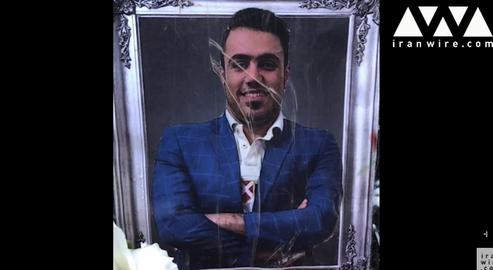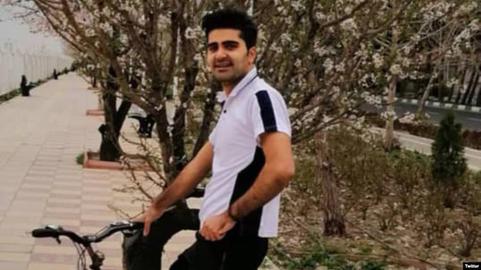“We had been engaged for three days. They were the best days of my life. We were to marry on January 16, but they took Meysam away from me. I wish that I were dead, too. Meysam was a very kind person. He would not even hurt a fly. He was a good person. And he was even better in those days, as though he knew that he was going to go.”
This is how Samieh Shirdel, who was engaged to Meysam Ahmadi, sums up her feelings over suddenly losing him last week. The 27-year-old Ahmadi was shot in the abdomen by security forces on Saturday, November 16, during protests in the Manzarieh neighborhood of Karaj, near Tehran. Ahmadi was taken to Madani Hospital where, after six days, he died from his wounds. The authorities returned Meysam’s body to his family three days later and he was buried at Behesht-e Sakineh Cemetery in Karaj.
Shirdel says her fiancé was shot as he was returning home from work.
“He was with a few of his friends,” she says. “I called him around 5pm and told him that the situation in the city was very chaotic [due to the protests] and he had better come back as soon as possible, because it was dangerous. He said that taxis were not taking any passengers and he was walking home. In Manzarieh, near Malard Road, he was shot in the abdomen and fell to the ground. His friends took him to the hospital.”
Ahmadi worked at a car repair shop; at the end of each workday, his hands would always be greasy. “When I saw Meysam lying on the hospital bed, his hands were still greasy,” she says. “I will never forget it.”
Shirdel says that Ahmadi was a kind and well-regarded young man, liked by his coworkers and clients. “Right now, you can go to the repair shop and ask why a black drapery is hanging there and they will tell you what they thought of Meysam,” she says.
On Sunday, November 17, the day after the shooting, Shirdel went to the hospital to visit Ahmadi. She says she knew that he had been injured but did not think it was serious; so she took him fruit juice and bananas, which he liked.
“As soon as [Meysam’s] brother Mohsen saw me he said that Meysam was in very bad shape,” Shirdel says. “They had bound his hands and feet to the bed so that he would not hurt himself when he regained consciousness because he was struggling. He was in excruciating pain, his body was black and blue and his eyes were puffy. ‘Meysam dear, wake up,’ I said to him. ‘Two days from now is your birthday.’ He woke up. My words pulled him out of his coma. He was getting better. I don’t know why he left me by myself. He had promised me that he would stay alive and live with me. My back is broken. I cannot take it anymore. I don’t want to remain in this world. I really don’t want to.”
Ahmadi had fallen victim to the random shooting of civilians by Iran’s security forces – used to crush unarmed protesters, even though he was not protesting.
“The bullet had cut through Meysam’s intestines and also damaged his spine and his spinal cord,” Shirdel says. “I don’t know whether he was hit in the back or in the front. I asked the doctors about it many times but I never got a clear answer. They would only say ‘pray for him.’ They did not even allow me to see the wound.”
I want the pictures back
Shirdel says that, while Ahmadi was in the hospital, she was mostly housebound because of her own difficulties; but she heard that security agents had visited the hospital, and had spoken to Ahmadi’s parents. The security officials still have his mobile phone and have not returned it.
“I begged them to return Meysam’s phone,” Shirdel says. “My phone has been stolen and now I have no pictures of the two of us. I said I would even pay them whatever they wanted just for them to return Meysam’s phone to me.”
Ahmadi’s family, afraid of retaliation by security agencies, have remained silent. They have asked Shirdel to do the same to protect Meysam’s grave.
“Meysam’s family are very good people,” Shirdel says, “but they are afraid that the authorities will destroy Meysam’s grave and then no sign of him would remain. ‘Don’t hurt Meysam’s soul,’ they tell me. ‘For God’s sake, don’t make trouble.’ That is why they have not told me much of what has happened. But I have decided I will not stay silent.”
Many reports have emerged that families of those killed in the recent protests must wait days – and sign various undertakings – before the bodies of their loved ones are returned to them. Shirdel is unaware if Meysam’s family were forced to sign such an undertaking [to not speak to the media] or not – but his body was not returned to his family until three days after his death.
“Meysam passed away on Thursday. The body was returned to us on Sunday and he was buried that day,” Shirdel says. “The whole family was present at the burial. We had a two-hour mourning ceremony at the mosque. But Meysam’s family said the agents had barred them from holding any ceremonies on the [traditional] third and seventh days after Meysam’s death. These ceremonies were held privately, at home, and the money was given to charity.”
Shirdel adds that she heard Meysam’s family did have to pay for their son’s body to be returned – but she does not know if this is true. The family have not said anything and she had not been in good health, mentally or physically, to be able to be involved.
Shirdel says this tragedy struck just when she and Meysam were at their happiest – when their future seemed full of a golden promise.
“I cannot even stand upright,” she says. “Where is Meysam now? He could not stand any harm done to me. What if he could see me know? Even if they give me the world, it is worth nothing without Meysam. I would live forever in those three days – those days are all I have left.”
Related Coverage:
They Killed My Son. I'll Continue to Fight for His Ideals, 29 November 2019
Iranian Doctors: The Protesters' Heads and Hearts Were Targeted by the Police, 28 November 2019
Uncle of Young Man Killed in Protests: We were Forced to Bury Him at Night, 28 November 2019
Security Forces Attacked Isfahan and then Blamed the Locals, 27 November 2019
Security Forces Kill a 13-Year-Old Bystander, 26 November 2019
Government Source: 218 Dead and 4,523 Arrested in Iran Protests, 25 November 2019
She was Helping the Injured When They Killed Her, 25 November 2019
He was Unemployed. He Protested. They Murdered him, 22 November 2019
Shutting Down the Internet to Get Away with Murder, 19 November 2019
Twenty Dead as Shots Fired From Friday Imam’s Helicopter, 19 November 2019
Iranian Kurdish City Under Siege and Family of the Dead Ordered to be Silent, 18 November 2019
visit the accountability section
In this section of Iran Wire, you can contact the officials and launch your campaign for various problems


























comments